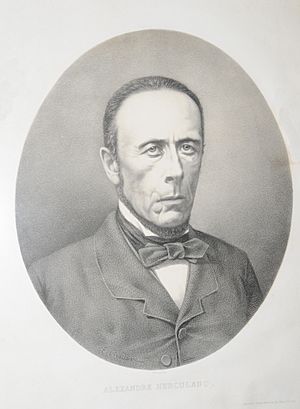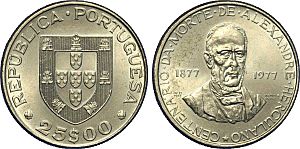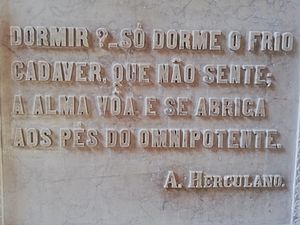Alexandre Herculano facts for kids
Quick facts for kids
Alexandre Herculano
|
|
|---|---|
 |
|
| Born | Alexandre Herculano de Carvalho e Araújo 28 March 1810 Lisbon, Portugal |
| Died | 13 September 1877 (aged 67) Santarém, Portugal |
| Resting place | Jerónimos Monastery |
| Occupation | Novel writer, poet, journalist, historian, politician |
| Language | Portuguese |
| Genre | Historical novel, Romantic poetry |
| Literary movement | Romanticism |
| Notable works | Eurico, o Presbítero, O Monge de Cister, História de Portugal de Alexandre Herculano, História da Origem e Estabelecimento da Inquisição em Portugal |
Alexandre Herculano de Carvalho e Araújo (born March 28, 1810 – died September 13, 1877) was a famous Portuguese writer and historian. He is known for his historical novels and for writing important books about Portugal's past.
Contents
Early Life and Adventures
Alexandre Herculano came from a simple family. His grandfather was a stonemason who worked for the king. Alexandre studied Latin, logic, and public speaking when he was young. He also spent a year studying math, hoping to work in business.
In 1828, Portugal was ruled by King Miguel, who had absolute power. Herculano joined a group that tried to change this in 1831, but they failed. He had to secretly leave Portugal and went to England and France.
In 1832, he joined a group of people who supported more freedom and rights, called Liberals. He was part of an army that landed in Portugal and took over the city of Porto. He fought in the long siege of Porto and also worked as a librarian there.
During this time, he published his first poetry books, A Voz de Propheta (1832) and A Harpa do Crente (1834). These poems showed his deep feelings and strong writing. They were inspired by Portugal's fight for freedom. He wrote about being in exile and the brave defense of Porto.
In 1837, he started a magazine called Panorama. It was like the English Penny Magazine. In this magazine, he published historical stories that were later collected in a book called Lendas e Narrativas (Legends and Narratives). In the same year, he became a royal librarian. This job helped him continue his studies of history. His magazine was very popular and helped teach people about Portugal's history and what was happening in other countries.
His Important Writings
Herculano was a poet first, but he also brought the historical novel to Portugal. In 1844, he wrote Eurico, a book similar to those by Walter Scott. This novel was about the fall of the Visigoth kingdom and how the Christian kingdoms in Spain began.
In 1848, he published another book called Monge de Cister (Monk of Cister). This story was set during the time of King João I. It showed how the middle class and cities started to gain power and chose a king who was different from the nobility.
These stories were written to teach people about history. Herculano was very knowledgeable about history. His novels helped many other writers in Portugal.
Writing History Books
Herculano also edited old historical records. He prepared for his biggest work, the "History of Portugal from the Beginning of the Monarchy to the end of the Reign of Afonso III." The first part of this book came out in 1846. He wrote it based on real historical documents.
It was very hard to write this book. He had to find old manuscripts from all over Portugal. He had to read them, organize them, and check if they were true. He also had to challenge old beliefs about history. Experts in Portugal and other countries praised his book. They said it was a top-quality historical work because of his careful research and accurate facts. The clear and simple writing style made it a classic Portuguese book. More parts of his history book were published in 1847, 1849, and 1853.
History of the Inquisition
When he was young, Herculano saw how absolute power could be unfair. This made him a Liberal. Later, attacks on his history books made him question some church ideas, even though he was a religious person.
He wrote "History of the Origin and Establishment of the Inquisition in Portugal" (1854–1855). This book told the story of King John III's struggle to create the Inquisition and the Jews' efforts to stop him. Herculano wrote it to push back against certain religious movements, but he presented the facts without much personal opinion.
Another important historical work by Herculano was his study on "Condition of the working classes on the peninsula from the seventh to the twelfth century." This book looked at the lives of working people in Portugal and Spain during that time.
Later Life and Retirement
In 1856, Herculano started editing a series of historical documents called Portugalliae monumenta historica. But he had disagreements with the person in charge of the archives, which stopped his work. After his friend King Pedro V died, Herculano left his job and moved to a country house near Santarém.
Herculano became disappointed with the way things were going in his country. He rarely left his retirement. When he did, it was to fight against political and religious groups he disagreed with. He supported Portugal's old religious orders and wanted them to be reformed, not shut down. He also opposed foreign religious orders coming into Portugal. He supported local priests and wrote about the simple village priest in his book Pároco da Aldeia.
Herculano also spoke out against an agreement between Portugal and the Pope in 1857. He believed in civil marriage, which is marriage recognized by the government, not just the church. His book "Studies on Civil Marriage" was even banned.
His Impact
Even in his later years, Herculano was seen as a very important writer and thinker in Portugal. People looked to him for guidance. However, he felt less hopeful about the future of his country.
In politics, he believed in a type of Liberalism where the middle class had power. He thought that common people could sometimes support unfair rulers. He also believed that extreme political ideas could lead to chaos. Even though he wrote political articles when he was younger, he didn't have much direct power in politics.
His Personality
Most of Herculano's writings were serious. But he once wrote a funny description of a trip from Jersey to Granville, where he made fun of English customs. This showed he had a sense of humor.
He was known for working very hard, being honest, and always seeking the truth. He was proud and didn't like criticism. He was also very independent. He could be stubborn but always earned people's respect. His poetry was strong and emotional, but also serious. His pamphlets showed his strong beliefs and his dislike for those he thought were weaker or less knowledgeable.
His "History of Portugal" is a great but unfinished work. He was good at analyzing facts and explaining political and economic events clearly.
Alexandre Herculano's body is buried in a grand tomb at the Jerónimos Monastery in Belém, near Lisbon. This tomb was paid for by public donations. His most important books have been printed many times, and he is still considered a very important historian of Portugal.
Family Life
In 1866, Herculano married Mariana Hermínia de Meira, whom he had loved for a long time. She was born around 1830. They did not have any children.
Main Works
Poetry
- The Voice of the Prophet (A Voz do Profeta) 1836
- The Believer's Harp (A Harpa do Crente) 1838
- Poems (Poesias) 1850
Plays
- The Frontier of Africa, or Three Nights of Heartburn (O Fronteiro de África ou três noites aziagas) (1838)
- The Princes in Ceuta (Os Infantes em Ceuta) (1842)
Novels
- The Village Parson (O Pároco de Aldeia) (1851)
- The Galician: Life, Sayings, and Deeds of Lázaro Tomé (O Galego: Vida, ditos e feitos de Lázaro Tomé)
Historical Novels and Stories
- The Jester (O Bobo) (1828–1843)
- The Monasticon (‘’O Monasticon’’) (two parts):
- Eurico, the Presbyter: Visigoth Era (Eurico, o Presbítero: Época Visigótica) (1844)
- The Monk of Cister; in the time of João I (O Monge de Cister; Época de D. João I) (1848)
- Legends and Narratives (Lendas e narrativas) (1851), a collection of short stories:
- The Qaid of Santarém (O Alcaide de Santarém)
- The Castle of Faria (O Castelo de Faria)
- The Vaulted Ceiling (A Abóbada)
- Destruction of Auria: Spanish Legends (Destruição de Áuria: Lendas Espanholas)
- The Black Bishop (O Bispo Negro)
- The Death of the Toiler (A Morte do Lidador)
- The Assassinated Master: Chronicle of the Templars (O Mestre Assassinado: Crónica dos Templários)
- Master Gil: A Chronicle of the Fifteenth Century (Mestre Gil: Crónica (Século XV))
- Three Months in Calcutta: First Account of the Indian States, 1498 (Três Meses em Calecut: Primeira Crónica dos Estados da Índia, 1498)
History Books
- "History of Portugal from the beginning of the monarchy to the end of the reign of Afonso III" (História de Portugal: 1.a época, desde an origem da monarquia até D. Afonso III) (1846–1853)
- "History of the origin and establishment of the Inquisition in Portugal" (História da Origem e Estabelecimento da Inquisição em Portugal) (1854–1859)
- Historical Monuments of Portugal (Portugaliae Monumenta Historica) (1856–1873)
Other Works
- From the Isle of Jersey to Granville (De Jersey a Granville) (1831)
- Studies on Civil Marriage (Estudos sobre o casamento civil) (1866)
See also
 In Spanish: Alexandre Herculano para niños
In Spanish: Alexandre Herculano para niños
 | Emma Amos |
 | Edward Mitchell Bannister |
 | Larry D. Alexander |
 | Ernie Barnes |



